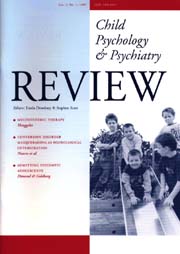Crossref Citations
This article has been cited by the following publications. This list is generated based on data provided by
Crossref.
Solity, Jonathan
2000.
The early reading research: Applying psychology to classroom practice.
Educational and Child Psychology,
Vol. 17,
Issue. 2,
p.
46.
Law, James
and
Durkin, Carmel
2000.
The Literacy Skills of Language-Impaired Children: Time for 'joined up' thinking?.
Educational Psychology in Practice,
Vol. 16,
Issue. 1,
p.
75.
Gervain, Judit
2002.
Az olvasás öröme?.
Magyar Pszichológiai Szemle,
Vol. 57,
Issue. 3,
p.
435.
Reason, Rea
and
Woods, Kevin
2002.
Dyslexia in evidence-based practice.
Educational and Child Psychology,
Vol. 19,
Issue. 3,
p.
68.
Lachmann, T.
2002.
Basic Functions of Language, Reading and Reading Disability.
Vol. 20,
Issue. ,
p.
165.
Katzir, Tami
Shaul, Shelly
Breznitz, Zvia
and
Wolf, Maryanne
2004.
The Universal and the unique in dyslexia: A cross-linguistic investigation of reading and reading fluency in Hebrew-and English-speaking children with reading disorders.
Reading and Writing,
Vol. 17,
Issue. 7-8,
p.
739.
Erskine, Jane M.
and
Seymour, Philip H. K.
2005.
Proximal Analysis of Developmental Dyslexia in Adulthood: The Cognitive Mosaic Model..
Journal of Educational Psychology,
Vol. 97,
Issue. 3,
p.
406.
Truman, Amanda
and
Hennessey, Neville W.
2006.
The locus of naming difficulties in children with dyslexia: Evidence of inefficient phonological encoding.
Language and Cognitive Processes,
Vol. 21,
Issue. 4,
p.
361.
McGeer, Victoria
2007.
Why neuroscience matters to cognitive neuropsychology.
Synthese,
Vol. 159,
Issue. 3,
p.
347.
Watt, Sharon E.
Shores, E. Arthur
and
North, Kathryn N.
2008.
An Examination of Lexical and Sublexical Reading Skills in Children with Neurofibromatosis Type 1.
Child Neuropsychology,
Vol. 14,
Issue. 5,
p.
401.
Katzir, Tami
Kim, Young-Suk
Wolf, Maryanne
Morris, Robin
and
Lovett, Maureen W.
2008.
The Varieties of Pathways to Dysfluent Reading.
Journal of Learning Disabilities,
Vol. 41,
Issue. 1,
p.
47.
Gibbs, Simon
and
Elliott, Julian
2010.
Literacy and Learning.
Vol. 23,
Issue. ,
p.
287.
Yildiz, Mustafa
Yildirim, Kasim
Ates, Seyit
and
Rasinski, Timothy
2012.
Perceptions of Turkish Parents with Children Identified as Dyslexic About the Problems that they and Their Children Experience.
Reading Psychology,
Vol. 33,
Issue. 5,
p.
399.
Dessalegn, Banchiamlack
Landau, Barbara
and
Rapp, Brenda
2013.
Consequences of severe visual-spatial deficits for reading acquisition: Evidence from Williams syndrome.
Neurocase,
Vol. 19,
Issue. 4,
p.
328.
Silva, Patrícia B.
Ueki, Karen
Oliveira, Darlene G.
Boggio, Paulo S.
and
Macedo, Elizeu C.
2016.
Early Stages of Sensory Processing, but Not Semantic Integration, Are Altered in Dyslexic Adults.
Frontiers in Psychology,
Vol. 7,
Issue. ,
Share, David L.
2021.
Common Misconceptions about the Phonological Deficit Theory of Dyslexia.
Brain Sciences,
Vol. 11,
Issue. 11,
p.
1510.




